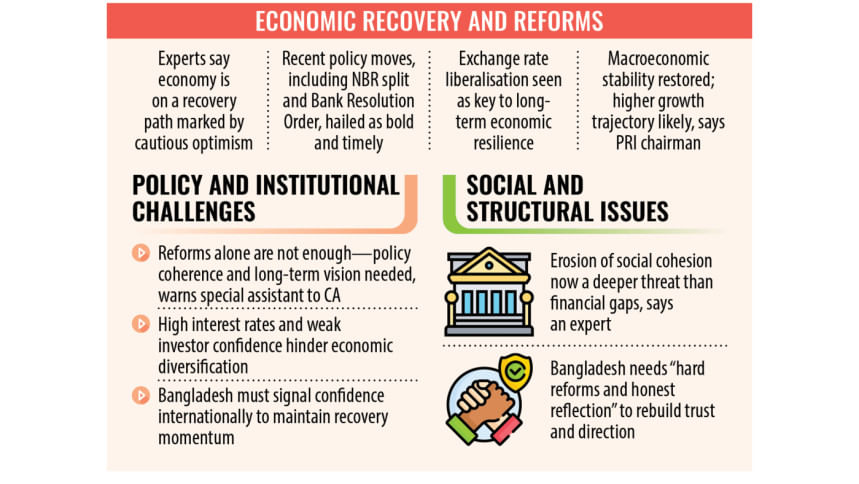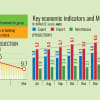Economy on path to recovery: experts

Bangladesh's economy is recovering after months of slowdown, with stability returning and confidence growing across various sectors, according to experts.
Speaking at the launch of the inaugural edition of the Monthly Macroeconomic Insights (MMI) by the Policy Research Institute of Bangladesh (PRI) at its Banani office yesterday, experts and economists expressed cautious optimism about the country's economic trajectory.
The MMI, a new analytical initiative by PRI's Center for Macroeconomic Analysis (CMEA), has been developed with support from the Australian Department of Foreign Affairs and Trade (DFAT).
"The economy is on a recovery path," said Ashikur Rahman, principal economist at PRI, calling it a pivotal phase marked by cautious optimism.
He termed the dissolution of the National Board of Revenue (NBR) and the Bank Resolution Order Ordinance 2025 as bold and timely steps by the interim government.
He said these reforms aim to ensure institutional clarity and long-term economic stability.
Addressing the event, Anisuzzaman Chowdhury, special assistant to the chief adviser, emphasised an urgent need to rebuild Bangladesh's social capital alongside reinforcing its economic foundations.
He remarked that while the country has progressed significantly in infrastructure and financial capacity, the erosion of social cohesion and public trust now poses a deeper, long-term threat.
"We need hard reforms and honest reflection," he said. "We are not poor in financial terms alone; our social fabric is also under strain."
Drawing from his early life experiences, Chowdhury reflected on how countries like South Korea and Japan overcame hardship through strategic vision, coordinated reforms, and long-term commitment.
"They didn't just push reforms -- they fixed goals and stayed the course. That's what we need."
Regarding Bangladesh's upcoming graduation from the least developed country (LDC) club, he called it both a challenge and an opportunity. "It's not just about metrics. Without a clear vision, reforms alone won't deliver. We need policy coherence."
He also pointed out that high interest rates, low investor confidence, and disjointed policies are hampering economic diversification. "Why invest in capital markets when banks offer 12 percent with less risk?"
Md Habibur Rahman, deputy governor of Bangladesh Bank, said Bangladesh's economic indicators are showing signs of gradual stability, driven by improvements in the current account and balance of payments.
"Exchange rate liberalisation will benefit Bangladesh on multiple fronts," he said.
He added that the macroeconomic situation has become more comfortable over the past nine months.
Rahman emphasised that despite recent turbulence, the country's fundamentals remain strong and resilient.
He stressed the importance of signalling confidence to the international community and said measures are in place to protect foreign exchange reserves and manage external pressures effectively, positioning Bangladesh for continued recovery.
Upon reviewing the economic growth scenario, Zaidi Sattar, chairman of PRI, pointed out that in the current year, macroeconomic stability has been restored, and the economy is poised to return to a higher growth trajectory.
"Our export potential is hobbled by a highly protective tariff regime that creates a persistent anti-export bias in policy incentives," he added.
Clinton Pobke, deputy head of mission at the Australian High Commission in Bangladesh, emphasised Australia's commitment to strengthening economic engagement with Bangladesh through a multi-pronged approach encompassing policy reform, trade and investment, and support for public policy discourse.
Speaking at the launch of the new initiative in collaboration with the PRI, Pobke expressed his appreciation for the quality of economic analysis presented.
Outlining Australia's three-track strategy, Pobke explained, "One track focuses on support for policy reform, another on enhancing bilateral trade and investment, and the third on strengthening the policy debate space in Bangladesh."
On trade and investment, Pobke highlighted a recent milestone. "In February, we appointed our first Australian Trade and Investment Commissioner based in Dhaka -- a major step forward."
He also announced the upcoming "Bangladesh-Australia Business Expo 2025" in Sydney, where he hopes to see strong bilateral participation.
Shams Mahmud, president of the Bangladesh-Thai Chamber of Commerce and Industry, said that businesses are currently operating primarily for the benefit of banks and the NBR, while entrepreneurs themselves are struggling to make profits.
Despite positive export figures, he said the business environment remains unfavourable due to persistent inflation and elevated bank interest rates.

 For all latest news, follow The Daily Star's Google News channel.
For all latest news, follow The Daily Star's Google News channel. 







Comments